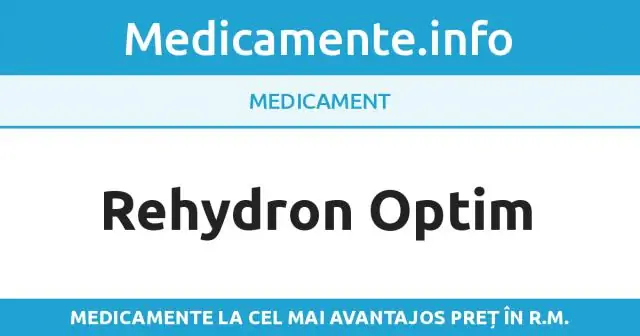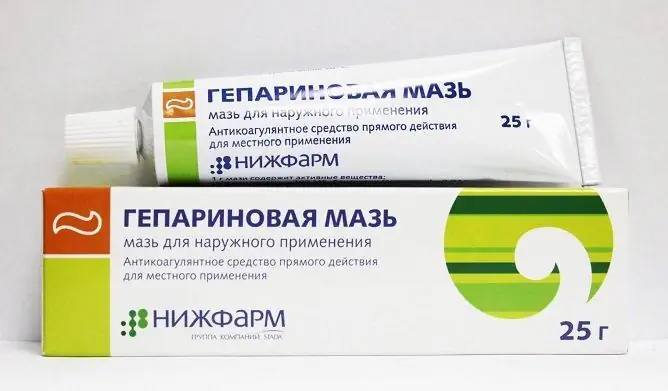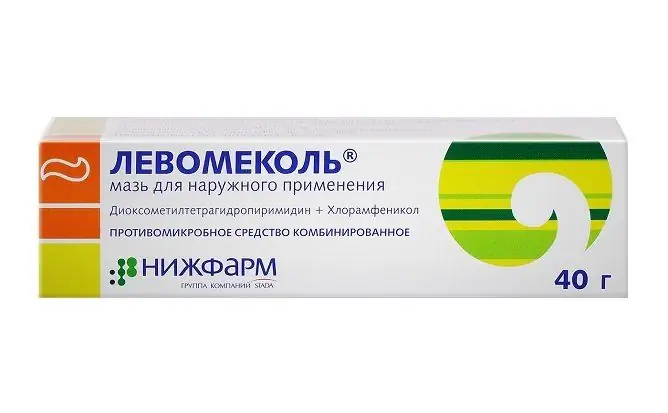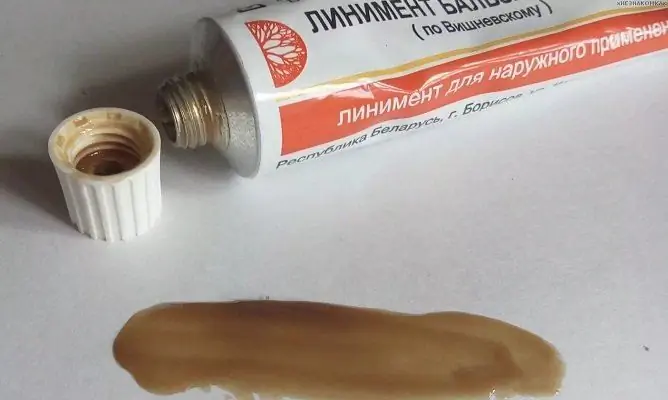Akriderm
Akriderm: instructions for use and reviews
- 1. Release form and composition
- 2. Pharmacological properties
- 3. Indications for use
- 4. Contraindications
- 5. Method of application and dosage
- 6. Side effects
- 7. Overdose
- 8. Special instructions
- 9. Application during pregnancy and lactation
- 10. Use in childhood
- 11. Drug interactions
- 12. Analogs
- 13. Terms and conditions of storage
- 14. Terms of dispensing from pharmacies
- 15. Reviews
- 16. Price in pharmacies
Latin name: Akriderm
ATX code: D07XC01
Active ingredient: betamethasone (betamethasone)
Producer: KhFK Akrikhin, JSC (Russia)
Description and photo update: 2019-16-08
Prices in pharmacies: from 77 rubles.
Buy

Akriderm is a combined preparation for external use, which has antiallergic, anti-inflammatory and antibacterial effect.
Release form and composition
Akriderm is produced in the form of 0.064% cream and ointment for external use in aluminum tubes of 15 g and 30 g.
1 g of the drug contains 640 μg of betamethasone dipropionate. Excipients: vaseline oil, paraffin, emulsifying wax, petroleum jelly, propylene glycol, Trilon B, sodium sulfite, purified water, nipagin.
Pharmacological properties
Pharmacodynamics
Betamethasone is a topical glucocorticosteroid. It has anti-inflammatory, antiproliferative, antipruritic, antiallergic, vasoconstrictor and antiexudative effects. The drug inhibits the accumulation of leukocytes in the body, and also slows down the release of pro-inflammatory mediators and lysosomal enzymes in the inflammatory focus, suppresses phagocytosis, reduces vascular tissue permeability, prevents the formation of inflammatory edema.
When applied to the skin, the drug quickly and intensively acts on the inflammation focus, reducing the severity of subjective sensations (pain, irritation, itching) and objective symptoms (lichenification, swelling, erythema).
Pharmacokinetics
With the cutaneous application of betamethasone in the recommended doses, its transdermal absorption into the blood is considered very insignificant. The use of occlusive dressings for inflammation and skin diseases can increase the transdermal absorption of the active ingredient, which can provoke the development of systemic side effects.
Indications for use
The active ingredient of the drug has an antipruritic, antibacterial and vasoconstrictor effect. Akriderm reduces vascular tissue permeability and prevents the formation of inflammatory edema; does not show activity against anaerobic microorganisms, fungi and viruses.
According to the instructions, Akriderm is used to treat:
- Acute, subacute and chronic contact dermatitis;
- Atopic, occupational, solar, dyshidrotic dermatitis;
- Neurodermatitis;
- Itchy skin;
- Psoriasis;
- Acute and chronic forms of non-allergic dermatitis.
Contraindications
The use of Akriderma has the following contraindications:
- Lupus;
- Post-vaccination reactions;
- Chicken pox;
- Viral skin infections;
- Herpes simplex;
- Acne rosacea (rosacea);
- Perioral dermatitis;
- Individual intolerance to any component of the drug;
- Lactation period;
- Children up to age 1 year.
The safety of using Akriderm during pregnancy has not been established, therefore, the drug can be used during this period only according to strict indications and in small doses.
Instructions for use Akriderm: method and dosage
It is recommended to apply Akriderm cream and ointment, lightly rubbing, on the affected skin from 1 to 3 times a day.
The duration of the course of treatment depends on the course of the disease and the therapeutic effect, but should not exceed three weeks. If no improvement occurs within two weeks of using the drug, the attending physician should be notified.
Side effects
The drug can cause the following side effects:
- Burning;
- Folliculitis;
- Skin irritation and dryness;
- Hypertrichosis;
- Allergic contact dermatitis;
- Hypopigmentation;
- Skin atrophy;
- Prickly heat;
- The appearance of stretch marks (skin stretch marks).
In case of undesirable effects, you should consult a doctor.
In case of an overdose, Akriderm is able to inhibit the function of the pituitary-adrenal system, thereby causing the development of secondary adrenal cortex insufficiency, as well as the appearance of symptoms of hypercortisolism, including Cushing's syndrome.
Overdose
Acute overdose of Akriderm is rare, however, when the drug is used in high doses or long-term therapy, symptoms of hypercortisolism develop in some cases: signs of Ishchenko-Cushing's syndrome, hyperglycemia, reversible suppression of the adrenal cortex function, glucosuria. In this case, Akriderm is gradually canceled and, if necessary, symptomatic treatment is prescribed.
special instructions
For children under 12 years of age, the drug is used only under strict indications and under medical supervision.
Akriderm is not recommended for long-term treatment of facial skin.
To avoid the development of fungal infections, glaucoma, cataracts and exacerbation of herpes infection, the drug should not be applied to the eye area.
Influence on the ability to drive vehicles and complex mechanisms
Akriderm does not affect the ability to drive vehicles or perform complex types of work that require increased concentration and quick psychomotor reactions.
Application during pregnancy and lactation
The safety of topical use of glucocorticosteroids (GCS) in pregnant patients has not been established. Therefore, the appointment of Akriderm during pregnancy is advisable only if the potential benefits of treatment for the mother significantly outweigh the possible risks to the fetus and its psychophysiological development. Pregnant women should not use the drug in high doses or for a long period of time.
If it is necessary to use Akriderm during lactation, lactating mothers should refuse breastfeeding.
Pediatric use
Children may demonstrate a higher susceptibility to the use of betamethasone, which contributes to the suppression of the hypothalamic-pituitary-adrenal system (HPA), compared with older patients due to increased absorption of Akriderm, due to the high value of the ratio of their surface area and body weight. In children treated with betamethasone, adverse reactions were observed such as increased intracranial pressure, suppression of the HPA system, poor weight gain, and Cushing's syndrome.
Suppression of the function of the adrenal cortex in pediatric patients is expressed in a decrease in the level of cortisol in the blood plasma and in the absence of a response to stimulation of ACTH (adrenocorticotropic hormone). Symptoms of increased intracranial pressure are bilateral swelling of the optic nerve head, headache, bulging fontanelle.
Drug interactions
There is no information on the interaction of Akriderm with other drugs.
Analogs
Structural analogues of Akriderm include the following drugs: Celestoderm-B, Beloderm, Betliben. Before replacing the drug with analogues, you should consult with your doctor.
Terms and conditions of storage
Store at a temperature of 15‒25 ° C out of the reach of children.
Shelf life is 4 years.
Terms of dispensing from pharmacies
Available without a prescription.
Reviews about Akriderm
The drug is very often used to treat skin diseases. As evidenced by reviews of Akriderm in the form of a cream, this dosage form is preferable for use in case of mild skin diseases, manifested in the form of slight itching, irritation and hyperemia. Ointment Akriderm is often purchased by patients who already know their diagnosis for sure. However, in this case, therapy is sometimes accompanied by complications, which is due to long-term treatment, which is accompanied by adverse reactions, a decrease in efficiency and the development of addiction.
Also, patients report that when using Akriderm for the first time, the unpleasant symptoms of the disease disappear rather quickly. With repeated use of the drug, longer treatment was often required, and the durability of the effect decreased. Sometimes the drug is used to treat acne, and the situation is similar. At first, skin rashes become invisible, but then they come back again, and this is often observed. Also, users report a deterioration in the structure of the skin and the alternation of light and pigmented areas on it during treatment. Many people do not have a clear idea of how and when to use Akriderm.
The addictive effect is explained by the fact that the drug does not affect the causes of the development of dermatitis and only eliminates the external manifestations of the disease. Therefore, their treatment can bring only temporary relief, which in the future can lead to serious complications. However, Akriderm can significantly alleviate the course of dermatitis and eliminate acute symptoms. It is best to combine it with agents that affect the causes of the disease: decoctions of medicinal herbs, vitamins, adsorbents, restorative drugs. Often patients are interested in whether the drug is hormonal or not. But experts say that when contacting a competent specialist who will carefully select a treatment regimen, and following the recommended dosage, Akriderm is relatively safe.
Price for Akriderm in pharmacies
The approximate price for Akriderm in the form of a cream is 92‒121 rubles (for a tube of 15 g) or 135‒159 rubles (for a tube of 30 g). You can buy an ointment for external use for 75-100 rubles (for a 15 g tube) or 102-119 rubles (for a 30 g tube).
Akriderm: prices in online pharmacies
|
Drug name Price Pharmacy |
|
Akriderm 0.05% ointment for external use 15 g 1 pc. 77 RUB Buy |
|
Akriderm 0.05% cream for external use 15 g 1 pc. RUB 98 Buy |
|
Akriderm ointment 0.05% 15g RUB 100 Buy |
|
Akriderm 0.05% ointment for external use 30 g 1 pc. RUB 104 Buy |
|
Akriderm cream 0.05% 15g 121 RUB Buy |
|
Akriderm ointment 0.05% 30g 122 RUB Buy |
|
Akriderm 0.05% cream for external use 30 g 1 pc. 140 RUB Buy |
|
Akriderm cream 0.05% 30g RUB 165 Buy |
|
Akriderm Genta ointment for external use 15 g 1 pc. RUB 180 Buy |
|
Akriderm Genta cream for external use 15 g 1 pc. 204 RUB Buy |
|
Akriderm Genta cream 15g 210 RUB Buy |
|
Akriderm SK ointment for external use 15 g 1 pc. 227 r Buy |
|
Akriderm SK ointment 15g 233 r Buy |
|
Akriderm Genta 0.05% + 0.1% ointment for external use 30 g 1 pc. RUB 250 Buy |
|
Akriderm Genta ointment 0.05% + 0.1% 15g 253 r Buy |
|
Akriderm Genta 0.05% + 0.1% cream for external use 30 g 1 pc. RUB 300 Buy |
|
Akriderm Genta ointment 0.05% + 0.1% 30g 348 r Buy |
|
Akriderm Genta cream 30g 348 r Buy |
|
Akriderm SK ointment for external use 30 g 1 pc. 352 r Buy |
|
Akriderm GK ointment for external use 15 g 1 pc. RUB 360 Buy |
|
Akriderm GK cream for external use 15 g 1 pc. 409 r Buy |
|
Reviews Akriderm GK 409 r Buy |
|
Akriderm GK ointment 15g 416 RUB Buy |
|
Akriderm SK ointment 30g 440 RUB Buy |
|
Akriderm GK cream 15g RUB 470 Buy |
|
Akriderm GK cream for external use 30 g 1 pc. 637 RUB Buy |
|
Akriderm GK ointment for external use 30 g 1 pc. 646 r Buy |
|
Reviews Akriderm GK 646 r Buy |
|
Akriderm GK cream 30g RUB 780 Buy |
|
Akriderm gk ointment 30g n1 792 r Buy |
| See all offers from pharmacies |

Anna Kozlova Medical journalist About the author
Education: Rostov State Medical University, specialty "General Medicine".
Information about the drug is generalized, provided for informational purposes only and does not replace the official instructions. Self-medication is hazardous to health!







